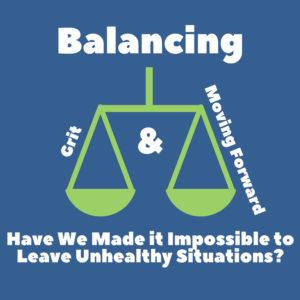Universities, companies, and teams that institute core values for their people typically include dedication among their priorities. The concept of grit takes dedication and adds the stipulation of unconditionality; through thick and thin, someone with grit will stick with it. It is a kind of courageous loyalty, a tenacity that gets excited about the notion of there being challenges ahead.
Persevering through hardships is unarguably a characteristic of great leaders. But when does grit transform into desperately holding onto a flawed relationship with a team, company, or person?
Do all commitments require grit?
I am the kind of person who needs to stay busy. For me, that means dedicating myself to a number of organizations, offices, and projects on and beyond my campus. Some of these commitments have been life-changing, valuable, and rewarding. For instance, I have learned so much from opportunities like interning for Swift Kick and attending an Alternative Break. So, I barely notice the large impact they have on my schedule.
To me, dedications like these hardly require any grit at all. They have more positive impacts on my life than negative, and the energy they need from me is given back to me tenfold. These commitments give me a voice, check in with me regularly, and make me feel like an important part of their teams. Powering through the inevitable rough stuff scarcely scares me because there are so few instances of feeling disempowered.
Not all of my commitments feel this refreshing, though. I don’t feel bad saying this because I know many people who feel similarly. There are obligations that require daily doses of grit to even show up to the table, let alone accomplish anything great. If you’re feeling exhausted at the thought of one of your commitments, I urge you to consider the pros and cons of exhibiting grit vs. moving forward.
Why is grit a thing, anyway?
Imagine a world without grit, and you’ll find a place barren of leaders, game-changers, and revolutionaries. Tenacity enables people to keep pushing when the world seems against them. There are encouraging benefits to persistence, like developing a strong sense of character and learning to overcome obstacles. Some examples of showing grit include:
Pushing past negative self-talk to accomplish your personal goals
Thinking on your toes in an everything-is-going-wrong situation
Showing up to difficult conversations
Perseverance is not a bad characteristic by any means. In my opinion, all the best leaders have overcome challenges to their work, their personality, or both. Opposition makes you better at articulating your opinions and forces you to develop more skills. However, all things in overabundance can be damaging. There comes a point where persistence requires moderation.
If I move on, won’t I be a quitter?
Our society values hard work, dedication, and commitment. We have all heard that we should never, ever, ever give up. Quitters never win, and winners never quit. None of this is untrue or bad to think. Getting back up after stumbling and continuing the race is commendable. Hard work–actually hard work–does usually end up with better outcomes. There are lessons worth learning when it comes to sticking with teams, companies, or organizations even when situations seem unresolvable.
However, some situations are simply unresolvable. Putting time and energy into people or projects that are draining, unfulfilling, or even hopeless is a losing game. While plugging it into our minds that quitters never win, we have made it impossible to feel good about stepping away from unhealthy scenarios. Grit has become synonymous with sacrificing parts of ourselves–our mental and emotional health, for example–in order to just keep going.
Sometimes we meet dead ends, and sometimes we are forced to move on. This is not quitting. Removing yourself from deeply displeasing situations is a way of healing yourself in order to reach your full potential in other areas of your life. The first step is to realize when you’ve hit a brick wall.
How do I know when I need to move forward?
Moving forward is a personal decision that only individuals can make for themselves. However, there are some signs that might tell you to move forward if they apply to you:
You feel like you do not have a voice. You feel disempowered, invisible, or ignored most of the time.
People have consistently placed undue blame on you for their mistakes. You are constantly taking blame for missteps, even if you aren’t at fault.
People do not confront you about criticisms they have of your performance, or they only criticize you insidiously.
You dread showing up. Anxiety, anger, or frustration flare at the mere thought of being there.
You have advocated for yourself on numerous occasions and have seen no changes in behavior or protocol.
Sound familiar? It might be time to take a step away. Moving on from situations like the ones above is not quitting. Likewise, sticking with situations like the ones above is not showing grit. You are quitting on yourself if you continue to force yourself to stay with mentally, emotionally, physically, or spiritually distressing teams or organizations.
Personally, I distance myself from the idea that sticking with something your heart isn’t in is only bad because it hurts the larger company or organization. While that might be true, it is also impersonal. When you are hurting because of a commitment, the focus should be on you. Persevering through an unchangeable bad situation hurts you. Sometimes moving on is the best choice for you.
We have focused so hard on developing grit in ourselves and our teams that we have made it impossible to move forward. Use these thoughts to healthily balance showing grit and moving forward in your own life.




